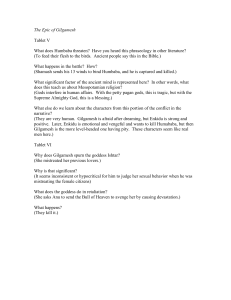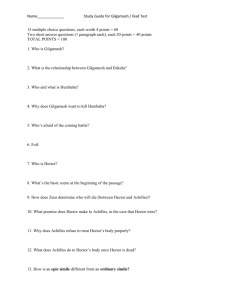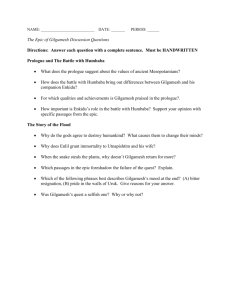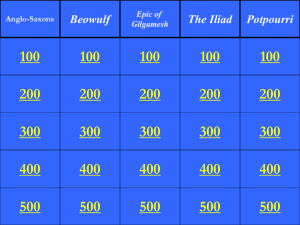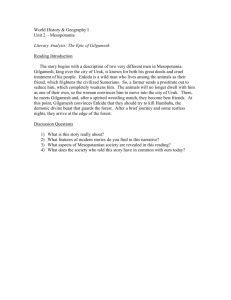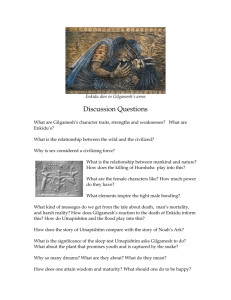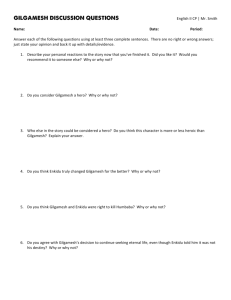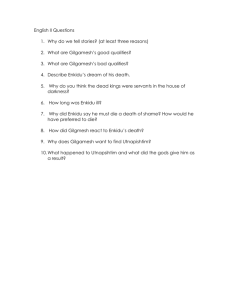Epic-Poetry-Test-Review-Answer
advertisement
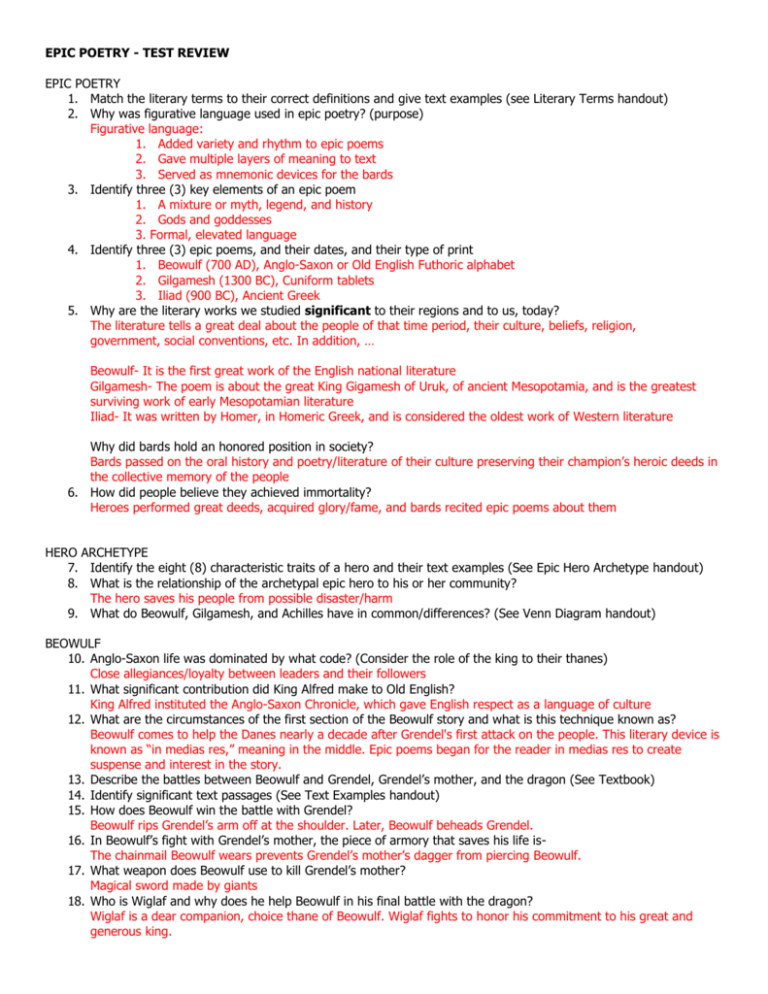
EPIC POETRY - TEST REVIEW EPIC POETRY 1. Match the literary terms to their correct definitions and give text examples (see Literary Terms handout) 2. Why was figurative language used in epic poetry? (purpose) Figurative language: 1. Added variety and rhythm to epic poems 2. Gave multiple layers of meaning to text 3. Served as mnemonic devices for the bards 3. Identify three (3) key elements of an epic poem 1. A mixture or myth, legend, and history 2. Gods and goddesses 3. Formal, elevated language 4. Identify three (3) epic poems, and their dates, and their type of print 1. Beowulf (700 AD), Anglo-Saxon or Old English Futhoric alphabet 2. Gilgamesh (1300 BC), Cuniform tablets 3. Iliad (900 BC), Ancient Greek 5. Why are the literary works we studied significant to their regions and to us, today? The literature tells a great deal about the people of that time period, their culture, beliefs, religion, government, social conventions, etc. In addition, … Beowulf- It is the first great work of the English national literature Gilgamesh- The poem is about the great King Gigamesh of Uruk, of ancient Mesopotamia, and is the greatest surviving work of early Mesopotamian literature Iliad- It was written by Homer, in Homeric Greek, and is considered the oldest work of Western literature Why did bards hold an honored position in society? Bards passed on the oral history and poetry/literature of their culture preserving their champion’s heroic deeds in the collective memory of the people 6. How did people believe they achieved immortality? Heroes performed great deeds, acquired glory/fame, and bards recited epic poems about them HERO ARCHETYPE 7. Identify the eight (8) characteristic traits of a hero and their text examples (See Epic Hero Archetype handout) 8. What is the relationship of the archetypal epic hero to his or her community? The hero saves his people from possible disaster/harm 9. What do Beowulf, Gilgamesh, and Achilles have in common/differences? (See Venn Diagram handout) BEOWULF 10. Anglo-Saxon life was dominated by what code? (Consider the role of the king to their thanes) Close allegiances/loyalty between leaders and their followers 11. What significant contribution did King Alfred make to Old English? King Alfred instituted the Anglo-Saxon Chronicle, which gave English respect as a language of culture 12. What are the circumstances of the first section of the Beowulf story and what is this technique known as? Beowulf comes to help the Danes nearly a decade after Grendel's first attack on the people. This literary device is known as “in medias res,” meaning in the middle. Epic poems began for the reader in medias res to create suspense and interest in the story. 13. Describe the battles between Beowulf and Grendel, Grendel’s mother, and the dragon (See Textbook) 14. Identify significant text passages (See Text Examples handout) 15. How does Beowulf win the battle with Grendel? Beowulf rips Grendel’s arm off at the shoulder. Later, Beowulf beheads Grendel. 16. In Beowulf’s fight with Grendel’s mother, the piece of armory that saves his life isThe chainmail Beowulf wears prevents Grendel’s mother’s dagger from piercing Beowulf. 17. What weapon does Beowulf use to kill Grendel’s mother? Magical sword made by giants 18. Who is Wiglaf and why does he help Beowulf in his final battle with the dragon? Wiglaf is a dear companion, choice thane of Beowulf. Wiglaf fights to honor his commitment to his great and generous king. 19. What last thoughts does Beowulf express as he is dying? Beowulf desires respect and fame for his ability to protect his people. Beowulf tells Wiglaf that he wants his burned-out funeral pyre and his monument to be a reminder to his people of his greatness. 20. How does Beowulf die and what do his people do to honor him? Beowulf suffers severe burn injuries from his battle with the fire-breathing dragon. Beowulf’s people sing praises around his funeral pyre, extolling his greatness. “…All of them distraught, chanting in dirges, mourning his loss as a man and a king. They extolled his heroic nature and exploits and gave thanks for his greatness…and cherish his memory…” 21. The most important event in Beowulf’s career as a leader of the Geats is the…? Attack on the dragon. A dragon is a fierce enemy, and when Beowulf defeats it, it is a great triumph. 22. Consider the creatures Beowulf fights. What do they represent/symbolize? 1. Grendel-darkness, death 2. Grendel’s mom-pure evil, retribution, revenge 3. Dragon-ultimate enemy/ultimate fame, selfishness, greed GILGAMESH 23. Where does the epic poem of Gilgamesh take place and what historical figure is it based on? Ancient Mesopotamia, King Gilgamesh of Uruk 24. Who is Gilgamesh? Enkidu? What is their relationship? Gilgamesh-legendary king and epic hero, familiar with society Enkidu-wild man of the forest, familiar with animals, intuitive Gilgamesh and Enkidu are close friends. 25. Who is Humbaba and what is his relationship to the gods? Humbaba is a fearsome giant and porter/slave of the gods. He looks similar to a water buffalo, and is just as intimidating. 26. Who are the foil characters in Gilgamesh? Gilgamesh-king or Uruk and Enkidu-wild man of the forest 27. What do the Elders of Uruk urge Gilgamesh to do? The Elders support Gilgamesh is his desire to fight Humbaba. Although they are concerned about the idea of having a war, they are encouraged by Gilgameshes enthusiasm. 28. Which character is most afraid of the upcoming battle and why? Enkidu is petrified by fear. He is familiar with the forest and knows what a formidable enemy Humbaba is. 29. The forest is called “Hell” by some and “Paradise” by others. What does Gilgamesh call it? Why is this important? Gilgamesh refers to the forest as, “The dark”. This is a foreshadowing of their fears, while in the forest, and the upcoming battle with Humbaba. 30. While Gilgamesh sleeps and dreams, Enkidu does what? Enkidu is petrified by fear, unable to sleep soundly. He stays awake haunted by the idea of fighting the fearsome Humbaba. When Gilgamesh awakes, Enkidu supports Gilgamesh by giving him positive interpretations of his dreams. 31. How does the battle transpire? List the events. 1. Gilgamesh strikes the cedar tree and challenges Humbaba 2. Humbaba comes to meet Gilgamesh and Enkidu 3. Gilgamesh and Enkidu, shocked by Humbaba’s pitiful appearance, hesitate to attack 4. Humbaba strikes first, beating and nearly crushing Enkidu to the ground. 5. Gilgamesh is petrified by fear and the appearance of his friend being beaten to death 6. Enkidu lunges, like a ram, forcing Humbaba to fall over to the ground. 7. Humbaba begs Gilgamesh for his life, promising he will be Gilgamesh’s slave/porter 8. Enkidu encourages Gilgamesh NOT to accept the false offer 9. Gilgamesh beheads Humbaba and hangs his decapitated head from a tree 10. Gilgamesh tends to his injured friend, Enkidu. 32. What tempting plea does Humbaba make Gilgamesh and what stops him from accepting? He states he will be Gilgamesh’s slave/porter, but Enkidu warns Gilgamesh Humbaba is lying 33. What similarities/differences do Beowulf and Gilgamesh share? Both hang their trohy kills as a witness to their achievement, both are confident, both have a caring side, etc…… 34. How does Humbaba compare with the monster figures in the Beowulf epic? (similarities/differences) Both are powerful, dangerous (lethal) opponents, creatures of their nearby habitiat, etc. ILIAD 35. Who wrote the Iliad and why was he considered “blind”? Homer wrote the Iliad. He was considered “blind” because had great insight of people, their thoughts, behaviors, etc. 36. What is an epic simile? An extended simile 37. Epic similes are also known by what name? Homeric simile 38. Where does the Iliad take place? Ancient Greece 39. How did the Trojan War begin? There was a beauty contest between three goddesses. Each goddess tried to bribe Paris, the competition judge, into choosing them. Paris accepted Aphrodite’s gift of having Helen, the most beautiful woman in the world, as his wife. The war began because Helen was already the wife of King Menelaus of Greece. So, the Greeks sought to get Helen back, and the Trojans fought to keep her. 40. Who is Hector? (His position) Achilles? Hector is the beloved prince, son of King Priam, and the great Trojan commander Achilles is part god, infallible (except for his heel) and a mighty Greek warrior 41. Which gods assist Hector (Trojans) and Achilles (Greeks)? 1. Hector (Trojans)-Apollo 2. Achilles (Greeks)-Athena 42. What is occurring at the very beginning of our selection of The Iliad? Achilles is chasing Hector around the walls of Troy, hunting Hector down to kill him 43. How does the goddess Athena deceive Hector? Athena appears to Hector disguised as Deiphobus, Hector’s favorite brother 44. How does the chief god, Zeus, determine Hector will die? Zeus weighs Achilles’s and Hector’s fates on a scale. Hector’s side drops, showing he will die. 45. What is Achilles’ greatest character flaw, or hubris? Arrogance, anger, revenge 46. What appeals does Hector make to Achilles and why does Achilles refuse Hector’s requests? Hector asks that his body not be mutilated, but returned to his parents, so he could have a proper burial. Hector even offers payment or a reward, if Achilles concedes. Achilles seeks revenge for the death of his dear friend, Deiphobus, who was killed and had his armor stripped by Hector. Achilles wants revenge for the loss of his beloved friend. 47. How do the Greeks respond to seeing the dead body of Hector? What does Achilles do to Hector’s body? The Greek warriors are first in awe at Hector’s greatness, then, they spear his body, mutilating it. Achilles drags Hector’s body, behind his chariot, around the walls of Troy. TEXT EXCERPTS Identify the poem and what significant scene each text excerpt comes from: 48. “He came to, ripped him apart, cut his body to bits with powerful jaws, drank the blood from his veins, and bolted him down, hands and feet; death…great teeth came together, snapping life shut.” Beowulf Book 1 - Grendel comes to the Hall of Herot and eats a sleeping thane. 49. “Men at arms, remain here on the barrow, …this fight is not yours, nor is it up to any man except me to measure his strength against the monster or to prove his worth. I shall win the gold by my courage, or else mortal combat, doom of battle, will bear your lord away.” Beowulf Book 2 - Beowulf instructs his thanes to allow him to challenge the dangerous dragon alone. 50. “Of all the kings upon the earth he was the man most gracious and fair-minded, kindest to his people and keenest to win fame…nowhere…was there a warrior worthier to rule over men.” Beowulf Book 2 - Beowulf’s people extoll their great king at his funeral services. 51. “His friend in agony, he still was captive to his dreams which he would tell aloud to exercise: I saw us standing in a mountain gorge, a rockslide fell on us, we seemed no more than insects under it. And then a solitary graceful man appeared and pulled me out from under the mountain. He gave me water and I felt released.” Gilgamesh - Gilgamesh describes his nightmare to his friend, Enkidu, before their battle with Humbaba. The dream foreshadows the events of the following day. 52. “His shoulders, like a porter’s under building stones, were permanently bent by what he bore; he was the slave who did the work of the gods but whom the gods would never notice, monstrous in his contortion, he aroused the two almost to pity.” Gilgamesh - A description of the dangerous and fearful monster, Humbaba, as he approaches Gilgamesh and Enkidu for their battle in the Cedar Forest. 53. “I know you well-I see my fate before me. Never a chance that I could win you over…But now beware, or my curse will draw god’s wrath upon your head…for all your fighting heart-destroy you at the Scaean Gates! Iliad Book 22 - Hector realizes he will lose the battle with Achilles, and warns/curses Achilles to be honorable with his death, or Achilles will also be destroyed. 54. “Beg no more, you fawning dog…Would to my rage, my fury would drive me now to hack your flesh away and eat you raw - such agonies you have caused me!” Iliad Book 22 - Achilles, outraged at Hector for killing his dearest friend, threatens Hector before killing him in battle. This excerpt shows Achilles’s uncontrollable anger.
